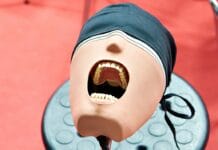Dental hygiene students begin preparing for board exams starting from the beginning of the program up until the day of the exam. Whether it be honing in on instrumentation skills or hitting the books, students have a lot to master before they are deemed competent in the practice of dental hygiene. As a student, some of the most daunting times of any class are midterms, final exams or tests in general. Written and clinical board exams fall under this stressful category, to say the least. Although these times are less than favorable, there are ways to alleviate some of the stress before the big day.
In these stressful times, it’s good to take a step back and evaluate how you learn best. There are three primary learning types:1
- Visual: Learning by seeing
- Auditory: Learning by hearing
- Tactile: Learning by touch and feel
It is crucial to determine what group you’re in before you can maximize your learning ability. One resource to determine what kind of learner you are can be found here. Still stressed out? Don’t be – study techniques can be individualized to fit your specific learning style. Different studying techniques can be used in conjunction with dental hygiene curriculum to prepare you and other students to do their best on boards.
Here are some examples:
Visual Learning Techniques
- Converting words into pictures: If you associate words and pictures together, it can be easier to remember.
- Videos: Ah, YouTube. This is a great addition to traditional studying. Not getting a concept? Type it into YouTube and make sure to look for a reputable source (how to find a reputable source). You are bound to bring up a summary video to help put the pieces together.
- Color coding: Color coding based on classes and topics is a great way to stay organized. The color coding goes back to association of words to pictures. If you can associate a color to a topic, sometimes that topic is easier to remember.
Auditory Learning Techniques
- Videos: Taking a long drive? If you’re an auditory learner this may benefit you greatly! Playing a video or podcast about a test topic can mindlessly help that information stick in your head.
- Listening closely in class: Studying for boards is a “day 1” kind of commitment. If you are an aural learner, you need to take advantage of class time as study time.
- Verbal refresher/Talking it out: A great way to know that you have a topic down pat is to teach it to someone else. If you can explain or teach a topic to someone else, you are in the clear.
Tactile Learning Techniques
- “Do-ers”: Tactile learners are commonly referred to as do-ers because they do just that. They learn best by doing an activity like labs or clinic times. Tactile learners may also learn by putting their knowledge into action by talking to patients.
- Write it out: Writing or drawing about a topic puts your mind to work in an active way. This process may help students grasp difficult topics easier.
- Board Review games: There are tons of apps with board review practice questions. By forcing yourself to answer questions in a fun and active way, you are more apt to actually study because you’ll enjoy it!
- Quiz yourself: Throughout school, the questions I remember the most are the ones that I missed on an exam. Quizlet (https://quizlet.com/) has tons of flashcard sets online that can be specific to the chapters in your textbooks.
General Learning/ Studying Techniques
Start studying early and build upon your knowledge. It’s so much better to learn for the long run than just learn for the test. Don’t just dump your knowledge when you turn it in. This way when it’s time to study for boards, you will be reviewing rather than relearning.
- Keep all of your notes from every class.
- Spread the studying out over a long period of time and do a little studying each day. We all know that the material covered in a dental hygiene program, or any program involving the human body, is complex and compound. Everything builds on the other and it will be much more overwhelming if you wait until the last minute.
Figuring out what learning type you are is the first step to learning effectively. No matter what technique fits you the best, the only foolproof way to do well on a board exam is to put in the work. You have to strive to do well and studying must be a priority. Skip the stress and hit the strategies when you prepare for the written and clinical board exams. Happy studying!
Before you leave, check out the Today’s RDH self-study CE courses. All courses are peer-reviewed and non-sponsored to focus solely on high-quality education. Click here now.
Listen to the Today’s RDH Dental Hygiene Podcast Below:
Reference












